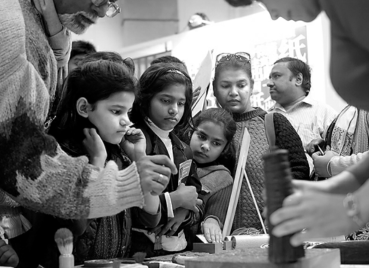 |
|
The demonstration of ancient Chinese printing attracts a crowd of young visitors in New Delhi World Book Fair.[Photo/Xinhua] |
Close to the entrance of China's pavilion at the New Delhi World Book Fair, visitors gathered to watch an ancient printing technique and publishing culture.
Li Ying was busy smearing red ink on an engraved sandal woodblock. Hurriedly she lifted a leaf of ivory-colored rice paper (xuanzhi) from a ream of sheets and adjusted it over the block. Once satisfied, she picked up a roller and gently pressed the paper to allow the inscriptions to be cast on it. She lifted the paper to reveal a freshly printed image of Buddha with his disciples.
Li handed it over to the visitors and encouraged the inquisitive ones to try their hands on somewhat smaller blocks. While she took out prints from her block, she kept instructing those replicating the technique.
"It is a unique way to make prints, and I will keep this as a souvenir in my home," says Ashish, a visitor.
Like Ashish, Paromita Singh watched the technique and asked for a print for herself to take home.
"I had made my mind to visit the stall, as China had been named the guest of honor this year," Singh says. "I was sure there would be something interesting and different there."
Li, a researcher from the China Printing Museum, is part of a visiting delegation and demonstrates on-the-spot printing techniques.
She says she has handed out more than 200 prints of woodblock printing of Sakyamuni preaching to visitors during the first three hours after the festival began on Saturday. The fair will run through Jan 17.
"This is a very old printing technique and dates back to the Tang Dynasty (AD 618-907), and the illustration is a perfect representation of the great printing techniques," she says. "It is very meaningful to people in India because it is about Buddhism."
A few steps past the printing demonstration, visitors were led to a space meant for showcasing Chinese tea culture.
|
|
|
|
|
|
|
|
